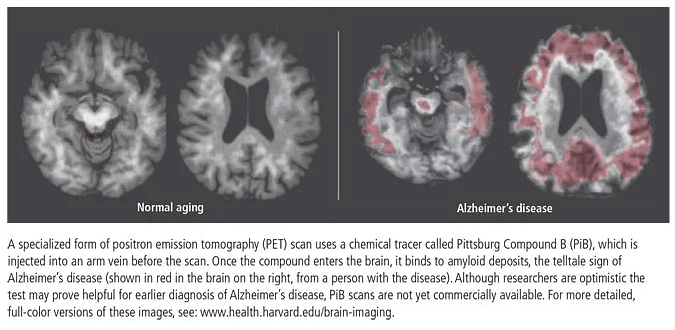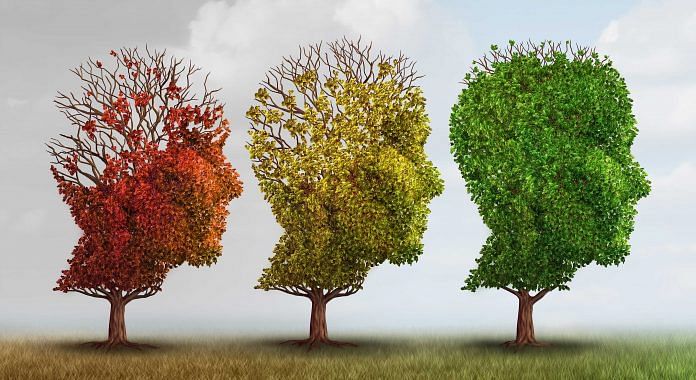Of the estimated 46.8 million dementia patients in the world, 60 to 80 per cent are believed to suffer from Alzheimer’s.
Bengaluru: Alzheimer’s, a degenerative, irreversible brain disorder that progressively impairs and destroys thinking and memory, remains one of the world’s most confounding medical mysteries over 110 years after it was first diagnosed in a 56-year-old German woman.
Friday, 21 September, marks World Alzheimer’s Day, which is part of a larger campaign, World Alzheimer’s Month (September), aimed at creating more awareness about the disease.
Alzheimer’s is believed to affect tens of lakhs in India alone. As we don’t have a cure for the disease yet, awareness is considered the key to early diagnosis and treatment, as well as possible prevention. ThePrint explains.
Alzheimer’s and its causes
Alzheimer’s is the most common form of dementia. Of the estimated 46.8 million dementia patients in the world, 60 to 80 per cent are believed to suffer from Alzheimer’s.
In later stages, it is known to impair patients’ ability to even carry out simple day-to-day tasks.
The disease generally affects people aged over 60, with less than 2 per cent of known cases comprising younger patients. An Alzheimer’s diagnosis in one’s 40s or 50s is not unheard of. When it occurs among younger people, it’s called early-onset Alzheimer’s.
There is no specific cause of Alzheimer’s. There is definite indication of genetic predisposition, but lifestyle also seems to play a role.
Also read: The search to cure Alzheimer’s leads to a crash and raises more questions
Diabetes and hypertension have been found to increase the risk of the disease. Other risk factors include sleeping disorders, family history, age, and gender; women are more prone to it than men. Head trauma and injuries have also been found to be a contributing factor.
As there are no identifiable causes, there is also no established way to prevent Alzheimer’s. It is said and accepted that mental stimulation through puzzles and games like Sudoku, crossword, board games, reading books, learning languages, or playing musical instruments is helpful.
Additionally, a good diet with vegetables and exercise can help delay the onset and subsequent spread.
Diagnosis and care
In India, as the ageing population increases, Alzheimer’s is on the rise too. Estimates from the Dementia India Report of 2010 put the number of patients at 3.7 million, with Alzheimer’s making up to 75 per cent of those numbers in India.
A large part of why such a big chunk of dementia patients suffer from Alzheimer’s is because it isn’t diagnosed early enough or remains undiagnosed altogether. In fact, one of the biggest problems with the disease is diagnosing it.
“Since the symptoms start with memory loss, and also set in at 65 to 70 years of age, people often just confuse it for old age,” said Sreeram Krishnan, a former researcher in Alzheimer’s Disease at PSG Tech, Coimbatore.
“A good sign to know when a check-up is needed is when older people start to forget things they do daily, such as the route they take to get home,” he added.
Methods for diagnosis include extensive interviews with the patient and their close relatives and friends to rule out other causes. This is then followed by brain imaging tests like magnetic resonance imaging (MRI), computerised tomography (CT), and positron emission tomography (PET).

Survival
Unfortunately, once diagnosed, Alzheimer’s cannot be cured, just treated.
“There exists no cure for it currently, and the only recourse is to prevent its growth rapidly,” said Krishnan.
Alzheimer’s is still classified as fatal because of its indirect consequences, such as the inability to take care of oneself in a dangerous situation or the increased risk of diseases like pneumonia and cancer. Most patients do not survive more than 14 years after the diagnosis.
Also read: Long exposure to air pollution can slow down your brain’s functioning, says new study
Once again, lots of mental and physical exercise, coupled with a healthy diet and medication, is the way to go to prolong life and reduce the rapid spread of the disease.
Since Alzheimer’s isn’t a very obvious illness, and doesn’t require hospitalised medical monitoring, care-givers are usually family members.
Care costs per year amount to approximately ₹43,000, with dementia care making up the 18th largest industry in the world at $818 billion, according to a 2015 Alzheimer’s Disease International report.
Improved diagnostic tests and equipment are making the diagnosis process easier each year. And as with most untreatable diseases, early diagnosis is the key.




Have possibly a million factoids stored neatly in my mind, to be recalled and collated when the occasion demands. All dating from pre Google search days, when human memory was valuable. That gives hope that Alzheimer’s is not on its way …